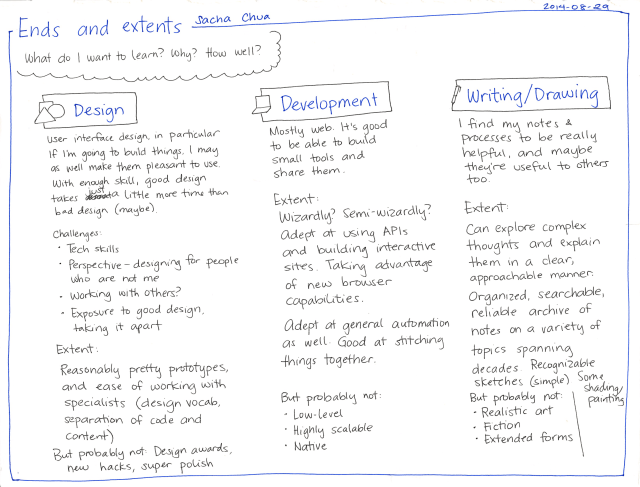Learning with the end in mind
Posted: - Modified: | learningI like thinking about what I want to learn and how well I want to learn it. This helps me accept my limits and prioritize my time. I'm not going to master everything. I want to learn just as much as I need. Maybe a little more, so I can do other interesting things. There's this idea of a minimum effective dose (recently-ish popularized by Tim Ferriss). It makes sense to me because I like paying attention to diminishing returns, when more effort on something doesn't pay off as well (and could probably be diverted to more effort on a different thing which would).
So, what are some of the things I'd like to learn more about? To what end do I want to learn them–what are my higher goals? Thinking about secondary goals helps me see if I'm wandering off-track or if there are more effective ways to reach those higher goals. To what extent do I want to learn? What's too little, what's too much, and what would be just right?
Design is one of the things on my to-learn list. I want to learn more about design because that will help me with development. Programming helps people save time, but you save the most time and create the most value when people keep using your tool because it's useful and understandable. You can't just pick up good design off a book or in a course, unfortunately. Well, you can get the basics of design, but I'm not sure if there's any way around sheer exposure and experience. I don't just want to know the theories and the rules – that would be too little. I don't need to win any awards, though. I would like to be able to build decent-looking prototypes that are pleasant to use, and to be able to quickly shape the prototypes based on user feedback. That should help me get around the challenges of building for people who are not me, since I'm happy with admittedly arcane interfaces.
Development is another useful set of skills to focus on because it helps me make stuff. I can add more tools to my toolkit, and I can go deeper. I don't want to learn tutorial-level skills for a dozen languages just to be able to say that I know them – that would be too little. But I don't need to do deep wizardly things, either. If I can build little tools and prototypes, gradually applying more of the accepted practices like testing, I should be okay.
I lump writing and drawing together. For me, they're about thinking through, capturing, and sharing ideas. I want to be able to think clearly and take good notes so that I can live better and make better decisions. Just knowing the mechanics of grammar or layout is too little. But I don't need to write award-winning prose or draw realistic art, either. I want to be able to write notes that I can make sense of years later and that other people might find useful, and I want to be able to quickly draw recognizable things that unlock memories for me and make ideas approachable for other people.
What are the things you're focusing on learning? To what ends, and to what extents?


4 comments
Charles Cave
2014-09-02T23:58:24ZPython - I use Python to write scripts to help me manage my life, my notes, and my music collection. I have found that I only use certain features but I have become fluent in these - for example: date manipulation, recursive descent through directories, formatted printing, pattern matching, parsing XML, reading and writing UTF-8 files (Japanese, Korean, and Chinese text). I am going to create my personal reference document of "Charles frequently used Python". This will be a useful quick reference.
Sketchnoting - building up my icon library. Your sketchnotes are great inspiration for icon ideas and I copy these into my A5 Visual Diary. I downloaded Autodesk Sketchbook Express for importing my hand drawings and adding colour.
Video Production - I use Camtasia Studio for my work, so I am developing my skills as a video maker using screen captures, movies made with iPhone, music, and still images.
Thank you for your continue inspiration!
filchiprogrammer
2014-09-03T01:42:48ZI am studying java and once I get to understand how to code in java, I would like to branch out to android development. I am liking java as a programming language. It feels convenient to me to express my logic in the code.
Tongjie Chen
2014-10-12T14:21:18ZI can recommend you a very good writing book, Writing Analytically by David Rosenwasser & Jill Stephen.
sachac
2014-10-22T23:40:39ZThanks! I'll keep an eye out for that book. =)